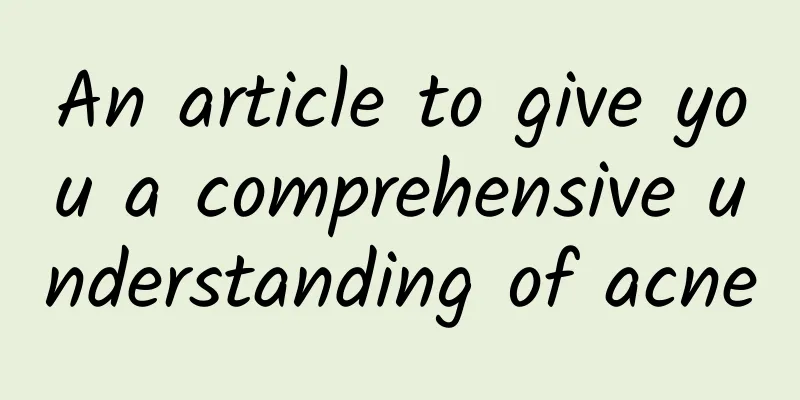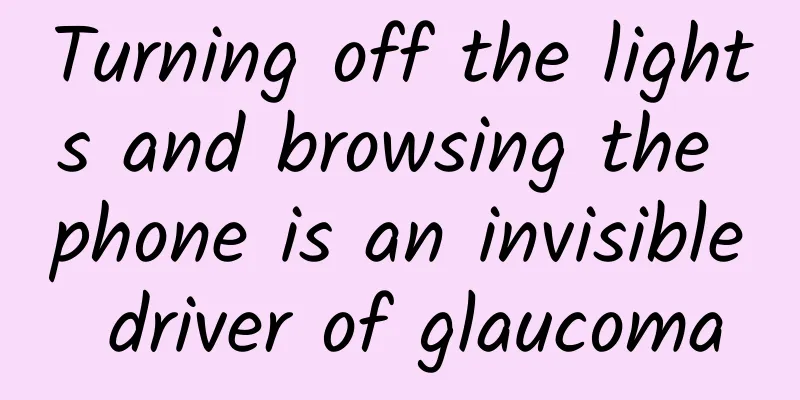An article to give you a comprehensive understanding of acne

|
Have you ever been troubled by acne and felt like your face was as bumpy as the surface of the moon? Don't worry, today we will bring you a comprehensive acne popularization article to let you know the causes, treatments and prevention methods of this common skin problem. Let's explore how to beat acne and regain your radiant skin! 1. Causes of acne Acne, also known as pimples or blackheads, is a common skin disease. Its causes are relatively complex, mainly including the following aspects: Hormonal changes: During puberty, changes in hormone levels lead to more secretion of sebaceous glands. Excessive oil can easily clog pores and cause acne. Increased bacteria in hair follicles: Increased bacteria in hair follicles can lead to inflammation, causing symptoms such as redness, swelling, and pain. Genetic factors: Studies have shown that acne has a certain genetic tendency, and some people's genes may be more likely to cause acne. Bad living habits: Eating greasy, spicy, irritating foods, staying up late and other bad living habits may cause or aggravate acne. 2. Symptoms and classification of acne The symptoms of acne mainly include whiteheads, blackheads, red and swollen pimples and cysts. According to the severity, acne can be divided into four levels: Mild (Grade I): Mainly acne, with a small number of papules and pustules. Moderate (Grade II): There are comedones and a moderate number of papules and pustules. Moderate to severe (Grade III): A large number of papules and pustules, occasionally large inflammatory lesions. Severe (Grade IV): Nodular, cystic, and/or acne, accompanied by pain. 3. Treatment and prevention of acne Mild acne: For mild acne, local treatment is usually used, such as topical ointments, retinoic acid ointments, etc. In addition, keeping the skin clean and avoiding squeezing acne are also important preventive measures. Moderate to severe acne: For moderate to severe acne, in addition to topical treatment, oral medications may be required, such as antibiotics, hormone drugs, etc. In addition, methods such as light therapy and chemical peeling also have certain effects. Prevention methods: Methods to prevent acne include maintaining healthy living habits and eating habits. Avoid staying up late and get enough sleep; eat a light diet, eat more fruits and vegetables; stay in a good mood and reduce stress. In addition, paying attention to personal hygiene, cleaning the skin regularly, and avoiding the use of overly greasy cosmetics are also important measures to prevent acne. 4. Daily care tips to beat acne Gentle cleansing: Use gentle cleansing products to avoid over-cleansing and irritating the skin. Wash your face less often in a day, usually once in the morning and once in the evening. Hydration and moisturizing: Maintaining the water-oil balance of the skin is the key to preventing acne. Choose moisturizing products that suit your skin type and avoid using overly greasy skin care products. Sunscreen and isolation: Ultraviolet rays can stimulate the skin to produce more oil and aggravate acne problems. Therefore, be sure to apply sunscreen when going out and try to avoid prolonged exposure to the sun. Regular work and rest habits: Get enough sleep and try to avoid staying up late. Good work and rest habits can help regulate hormone levels and reduce sebum secretion. Healthy diet: Eat less greasy, spicy, and irritating foods, and eat more fruits, vegetables, and other foods rich in vitamins. Keeping a light diet helps reduce oil secretion on the skin. Adjust your mentality: Keep a happy mood and learn to adjust your mentality. Long-term tension, anxiety and other negative emotions may lead to endocrine disorders and aggravate acne problems. Regular check-ups: If you find that your acne problem continues to get worse or does not improve, you should see a doctor immediately. Follow the doctor's advice for treatment to avoid delaying the best time for treatment. Conclusion: Through the above content, I believe you have a deeper understanding of acne. I hope this article can help you get rid of the troubles of "moon surface" and defeat the acne problem. Remember, maintaining good living habits and eating habits is the key to preventing and treating acne. From now on, let's work together to regain the radiance of our skin! |
<<: "Urticaria: Solve the mystery of itchy skin and regain your comfortable life!"
Recommend
What tests are needed for mastitis?
The main symptoms of mastitis include milk stasis...
Causes of brown vaginal discharge
We all know that leucorrhea is a substance secret...
If a child is injured and shows these symptoms, seek medical attention immediately.
If a child is injured and shows these symptoms, s...
How is static electricity generated? What harm does static electricity do to people?
In daily life, static electricity is everywhere, ...
How to treat a blocked fallopian tube?
Some women have gynecological diseases, which aff...
Itchy belly during pregnancy
Many women experience itchy belly after the secon...
Can I still have sex after menopause?
Many female friends have doubts about whether the...
Drinking malt water to stop breastfeeding will take effect in a few days
Drinking roasted malt soaked in water has the eff...
Is it good or bad to have blood clots during menstruation?
Every woman has a different physique, so she will...
What does buckwheat tea taste like? Will buckwheat tea expire?
Buckwheat tea is rich in protein, mineral element...
What causes pelvic effusion? Consider these factors
Pelvic effusion is a common gynecological disease...
Do myopia require glasses? 8 hard-core knowledge that parents are advised to keep in mind!
Zhou Chao, director of the Optometry Center of Ai...
Can adenomyosis drink brown sugar?
Nowadays, many women have irregular menstruation,...
Treatment of adenocystic hyperplasia
Menstrual irregularity is a common disease among ...
How harmful is pelvic inflammatory disease?
There are many patients with pelvic inflammatory ...









